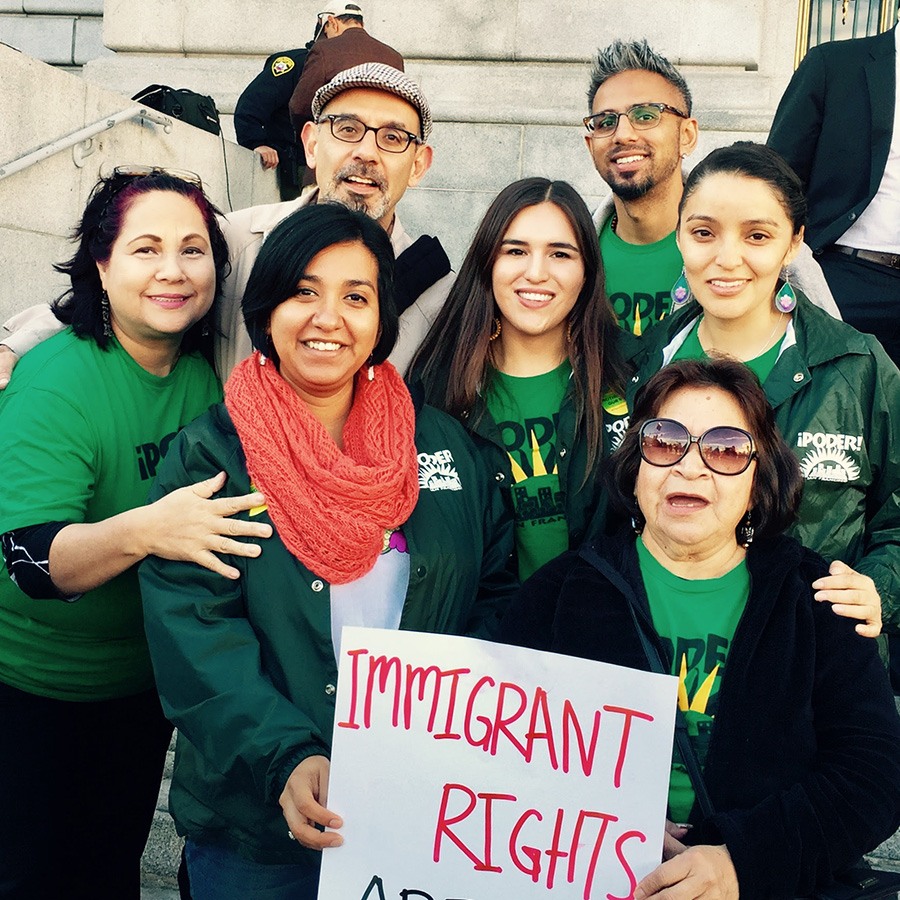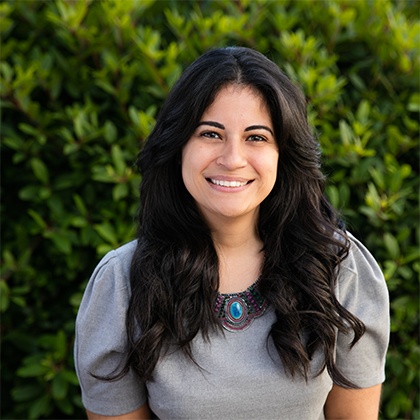
Our Community

PODER organizers in San Francisco
We sat down with Tides Senior Advisor Andrea Granda to learn how she applies the idea of Daring Change in her work with Tides partners.
You work with a variety of Tides partners who are committed and dynamic. Can you tell us about one partner who is taking on truly daring work?
It’s honestly hard to choose, because my whole portfolio is so amazing! But, for now, I want to spotlight the work of PODER, which stands for People Organizing to Demand Environmental and Economic Rights. They’re based right here in San Francisco, and have been with us at Tides for many years.
PODER’s mission is to organize Latino immigrant families around specific rights and issues, putting “people-powered solutions” in place. Those solutions are always community-led and environmentally just, taking into account the unique needs of a local group of citizens. PODER keeps a particular focus on young people, nurturing a lot of youth-led programs that fuel their practice. But whether it’s young folks, the community’s elders, or anyone in between, the organization is all about place-based, grassroots solutions to the problems that people identify for themselves. They know best what they need, and they can figure out how to address the issues that matter to them. In doing so, they build their own power.
What’s really daring about PODER is their ability to help communities transform the fabric of their own landscape. For example, one program in the Excelsior district of San Francisco has focused on designing and finalizing an urban farm. It’ll be carried forward by youth leaders from PODER’s Urban Campesinxs (note: this is a gender-neutral form of the Spanish word for “farmers”) Project. They’re creating a co-op academy to teach young people how to build the skills needed to run a farming cooperative. Elevating the community’s youth from the start helps them feel a sense of ownership over the program’s future. At a higher level, the community at large has greater access to healthy food, and the positive effects of good nutrition ripple throughout many different areas of life. Another program, Bicis del Pueblo, is a bicycle co-op that has equipped hundreds of community members with bikes, helmets, lights, safe riding trainings, and basic bike repair skills.
Both of these programs tackle some of the health issues often associated with poverty. The Excelsior district is in the southeast part of San Francisco; it contains the highest concentration of families with children in the city. 71 of the district’s students qualify for federally funded lunch programs. At the same time, there are fewer community gardens than in other parts of the city, and no farmer’s markets. And more residents there end up in the hospital for asthma than any other neighborhoods, due to pollution from nearby freeways. PODER helps communities choose their own responses to these problems, in coordination with city leadership, and create pathways for better health outcomes.
Active listening, rooted in empathy and respect, empowers me to do my part for the social justice we’re seeking to create together.
How do you, in your role at Tides, help accelerate daring change?
The agents of change that we bring together are part of a larger coalition of mission-aligned leaders who leverage our network so that they can scale; to that end, we help them with everything from infrastructure to strategic advising.
In this multifaceted role, I always start from a place of empathy and respect. I’m a safe outlet for their ideas and dreams – and I emphasize “safe,” because a lot of their work is particularly risky. What I strive to do is to cultivate my relationships so that each partner can share their challenges and concerns with me, no matter how big or small. It’s not always the first thing we talk about when we look at this work, but active listening, rooted in empathy and respect, empowers me to do my part for the social justice we’re seeking to create together.
How does Tides, as an organization, accelerate daring change in its relationships with partners?
At Tides, we really look beyond what’s happening today, or tomorrow. We take the long view. What that means is that we know that our relationships are long-term relationships, and we come up with ways to nurture them far into the future. We launch capacity-building programs for our projects. We develop and share new technology platforms, from a new grantmaking portal where partners can track their impact to a new accounting system that enables our social ventures to manage their finances towards long-term efficiency.
We know that we can’t predict what might happen in the next day, or week, or year – political changes, natural disasters, and domestic attacks can change the work or our partners in an instant. I appreciate that we prepare for the future, standing by to embrace risks and support leaders who are ready to take action. I’m excited to see what else we’ll be able to do for them as the world continues to shift.
The Tides approach involves five key elements: crossing boundaries and linking sectors, communities and cultures; acting with empathy and respect; engaging with those whose lives are most affected; embracing risk; and prioritizing ideas that scale. Can you expand on how one of them plays out in the work of one of Tides’ partners?
When it comes to embracing risk, I have to talk about Detention Watch Network, one of our social venture partners. They’re based in Washington, D.C., and they work on monitoring immigration detention centers around the country. At the basic level, they make sure that detention centers meet stated standards; however, they go far beyond that to advocate for changes that promote the rights and dignity of every person who enters that system. They’re part of a national coalition that works to expose and challenge injustices in the centers and within the deportation system at large.
The country’s climate right now around detention is difficult, and a lot of DWN’s work has become a lot more defensive. They used to invest more resources lobbying for new policies; now, they’ve shifted to grassroots organizing in order to protect what they’ve already built. Creating positive changes in the system starts with accountability – and to that end, DWN will make sure that detention centers follow stated policies and respect the human rights of the people inside them. But, of course, the political winds could change in the future, prompting further shifts in strategy. At Tides, we focus on staying nimble so that we can be there for our partners through whatever changes may come – trusting them to know what their communities need, but always here to provide guidance and support along the way.
 Andrea Granda is a senior advisor at Tides, where she’s been working since 2011 to help Tides’ partners create daring change.
Andrea Granda is a senior advisor at Tides, where she’s been working since 2011 to help Tides’ partners create daring change.

Read the stories and hear the voices of social change leaders fighting for justice.